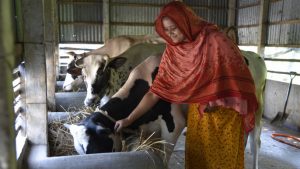The booming demand for one of the company’s core milk-based products has bucked trends in the struggling dairy sector. It was just one year ago in November 2019 that Dean Foods, America’s largest milk producer, filed for bankruptcy and cited America’s decreasing consumption of milk from cows.
Land O’Lakes’ butter sales are helping to boost the company’s profits, even as the pandemic disrupts global commodity markets. Lockdowns across the country cut demand from restaurants, but consumers are looking to cook and bake more from home. Minnesota-based Land O’Lakes, the largest dairy cooperative in the U.S., reports that consumer sales of butter have more than offset a decline in demand from foodservice, which usually accounts for 15% to 20% of its business.
“Oftentimes, even for the retail business, what you do is you make a lot of butter because it’s peak milk production time, and you store it for the key season,” Land O’ Lakes CEO Beth Ford said. “But the buying was so strong that we didn’t do that, because we were selling right off the line.”
COVID-19 hit at the worst possible time for the dairy industry, during the “spring flush,” when cows are at the height of their milk production, reported Fortune (Nov. 2). Schools and restaurants shut down just as cows reached their most productive time. Consumers were left with contradictory images—empty store shelves as shoppers stockpiled goods like butter, as farmers destroyed product they were unable to sell.
Land O’Lakes was able to spare farmers from having to dump milk, which Heather Anfang, senior Vice President of U.S. Dairy Foods, calls “emotionally and financially devastating.” The co-operative was able to find a home for its more than 1,700 members’ milk, despite the fact that before the COVID-19 outbreak, about 40% of the company’s business came from items it sold to the foodservice industry, such as giant bags of shredded cheese. That business disappeared once the pandemic hit.
“We had to really step back and look,” said Anfang. “It’s a bit of a puzzle—where’s the milk, where’s it going, and what are the products that are now most relevant.”
Land O’Lakes returned to the basics by scaling back on the number of items it produces, so the co-op could produce more volume. It also focused on its core goods, so it could run bigger items, like butter, for longer on its production lines. The company also took items it normally supplies to foodservice, like a one-pound block of butter, and instead sold them to grocers who were desperate to keep up with consumer demand.
Anfang expects Land O’Lakes will sell significant butter this year and much more than the company would have anticipated, but warns that the “swings have been dramatic.” For instance, retail butter sales will continue to do well, but it will remain difficult to sell a 50-pound bag of mac and cheese.













